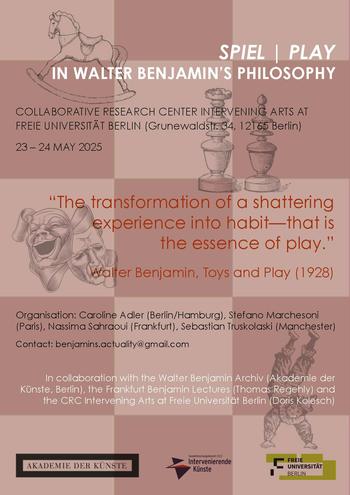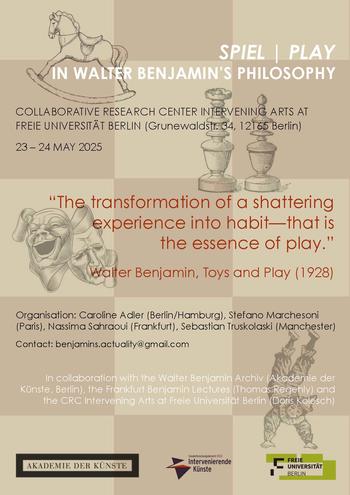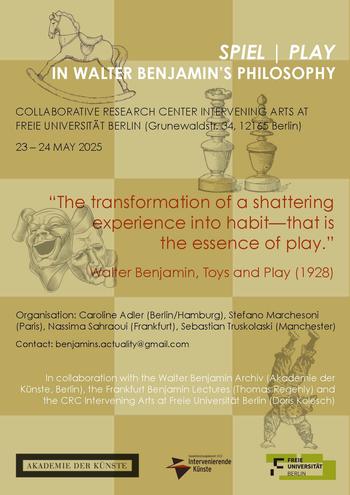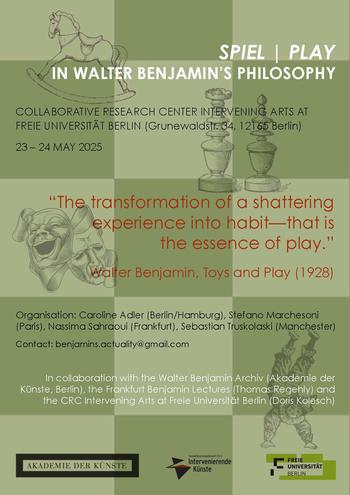Spiel | Play in Walter Benjamin's Philosophy
Spiel | Play in Walter Benjamin's Philosophy
Spiel | Play in Walter Benjamin's Philosophy
Spiel | Play in Walter Benjamin's Philosophy
Event in English spoken language | free admission | registration required | no barrier-free access
“The transformation of a shattering experience into habit—that is the essence of play.”
Walter Benjamin, Toys and Play (1928)
The notion of “play” is a central theme in Walter Benjamin’s work, ranging from children’s games, and the Baroque mourning play, to Brechtian theater, and the famous chess-playing machine at the beginning of his theses on the concept of history. “Play” – as both word and object – assumes importance when Benjamin invokes a “history of the concept of play” to unfold the relationship between reflection, play, and semblance in his book on The Origin of the German Tragic Drama. In addition to play in the area of concrete engagement with theatrical forms, as in Bertolt Brecht’s later works, including his epic theater, play remains of interest to Benjamin as a vital human capacity throughout his life. Play’s ability to “override the orders of experience” (On some Motifs in Baudelaire) transforms it into a site where boundaries are dissolved, thus harnessing new possibilities.
Crucially, Benjamin does not treat “play” and “playing” merely as metaphors or figures of speech. His awareness of contemporary theories of play (by thinkers such as Groos, Gröber, Freud, and Klages) informs his unique approach, situating play within a “world of signs”. Additionally, his later reflections on toys and play are shaped by his engagement with concrete (progressive) pedagogical movements at the turn of the century, along with the educational experiments in the nascent Soviet Union, which Benjamin observed with great interest during his stay in Moscow. For Benjamin, play and playing have an intrinsically transformative and subversive potential that breaches conventional frameworks, including the very notion of linearity and chronology (on stage as well as in history). In this “essence of playing” (Spielzeug und Spielen) lies a glimmer of hope for practicing the utopian, the different, the not-yet-known.
This two-day workshop aims at re-reading the philosophical foundations and historical potentials of Benjamin’s notion of “play”.
For this workshop we will be joined by Erdmut Wizisla (Berlin).
Since the event revolves around close reading sessions, some prior knowledge of Benjamin’s writings is strongly encouraged. Bilingual, German-English copies of the texts will be made available. To facilitate the discussion, the number of participants for this workshop is limited.
If you would like to participate, please send a message and a brief biographical note to the organisers by 30 March, 2025: benjamins.actuality@gmail.com
Organisation: Caroline Adler (Berlin/Hamburg), Stefano Marchesoni (Paris), Nassima Sahraoui (Frankfurt), Sebastian Truskolaski (Manchester)
In collaboration with the Walter Benjamin Archiv, Akademie der Künste, Berlin, the Frankfurt Benjamin Lectures (Thomas Regehly), and the Institute for Theater Studies at Freie Universität Berlin (Doris Kolesch from project B05)
Time & Location
May 23, 2025 - May 24, 2025
SFB 1512 Intervenierende Künste, Seminarraum, Grunewaldstr. 34, 12165 Berlin
Further Information
If you would like to participate, please send a message and a brief biographical note to benjamins.actuality@gmail.com by 30 March, 2025.



